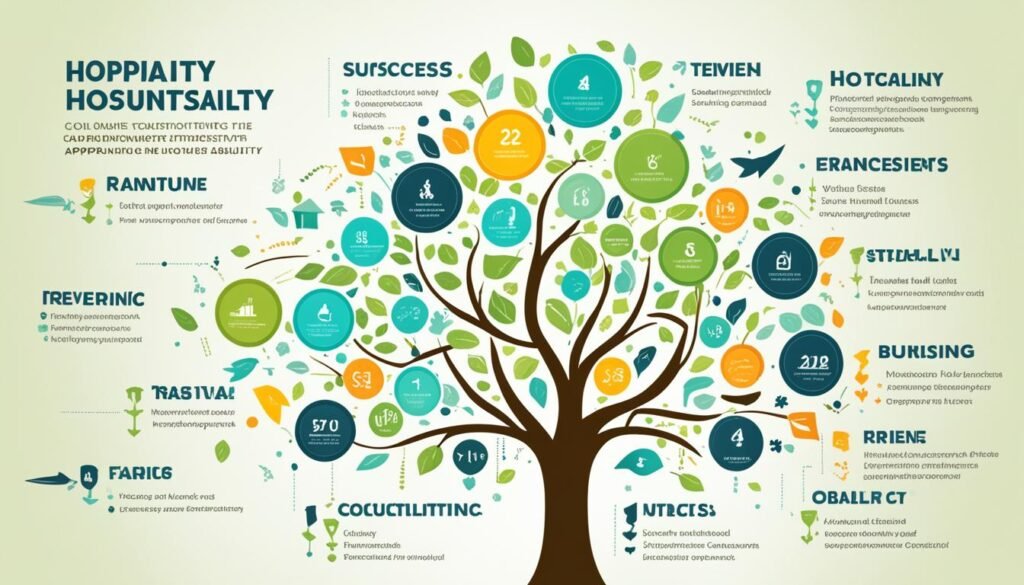Hospitality Financial Management Essentials Guide
Welcome to our Hospitality Financial Management Essentials Guide! In this guide, learn the basics of hospitality finance. We’ll provide insights into financial management practices in the industry. No matter your position in hospitality, knowing financial management is key for success.
Sarah is the owner of a boutique hotel. It’s in a top tourist spot. She loves giving guests a great stay. But, she found out managing money was just as crucial.
Despite a full hotel, Sarah’s profit wasn’t what she hoped. She found out her costs were more than expected. She needed better ways to handle her money.
Sarah made it her mission to learn about finance in hospitality. She went to workshops and asked experts for advice. She then used new ways to control costs. By managing revenue and using tools for analysis, her hotel’s finances got better.
Sarah’s experience shows how vital managing money is in hospitality. It’s not only about great service. Making wise financial choices is crucial for success. A good grasp of financial basics helps managers make smart moves for their business.
Key Takeaways:
- Hospitality financial management is crucial for making businesses profitable in the industry.
- Understanding the essentials of financial management is vital for informed decision-making in hospitality.
- Implementing good financial practices can boost financial health and lead to lasting success.
- Cost control, revenue management, and financial analysis are crucial parts of hospitality finance.
- Using financial tools can make financial work easier and help with precise reports and analysis.
Importance of Financial Management in the Hospitality Industry
Financial management is vital in the hospitality industry. It lets managers watch costs, control revenues, and make smart choices to boost profits. This industry’s unique aspects mean financial management must focus on special accounting principles.
In the quick and tough hospitality sector, good financial management is key. It helps managers use resources better, cut costs, and keep up with market changes. By doing all this, businesses can stay financially strong and grow steadily.
The Role of Financial Management
Financial management in the hospitality industry includes budgeting and cash flow management. It’s also about controlling costs without hurting quality and analyzing reports for better decisions.
- Budgeting: It involves planning how to use financial resources in different parts of a business.
- Cash Flow Management: Making sure there’s enough money for daily needs, investments, and emergencies.
- Cost Control: Finding ways to lower costs while keeping service quality high.
- Analysis and Reporting: Creating detailed financial reports, checking performance, and finding ways to do better.
Good financial management helps managers in hospitality businesses make choices based on data. It’s about getting more revenue, managing costs, and growing profits. This way, they can also see if investments are smart and understand risks and rewards.
Accounting Principles in Hospitality
For the industry to report finances and keep records right, it has its own accounting principles. These principles aim for accuracy, full disclosure, and following industry rules. Knowing and using these principles lets managers run their financial side well and keep the business strong.
Image: Financial Management in Action
The picture above shows the critical areas of financial management in hospitality. From planning budgets to analyzing finances, all these steps help achieve financial success in a busy, competitive market.
By using strong financial management with specific accounting principles, hospitality businesses can run more smoothly and profitably. This also improves the guest experience and ensures the business’s long-term success.
Financial Planning in the Hospitality Industry
Financial planning is crucial in managing money in hospitality. It’s about guessing how much money will come in, creating spending plans, and managing costs to reach money goals. By planning well, hotels and restaurants can use their money better and succeed for the long haul.
One important part of financial planning is handling money coming in. This means figuring out the best prices and ways to make the most money. It includes looking at what people want, how they act, and using prices to make more profit.
Using real-time data is key for making smart money decisions. With up-to-date tech and tools, hospitality leaders can spot trends in what people want, change prices as they need to, and choose the best ways to make more money.
Setting yearly budgets is at the heart of financial planning. These budgets help businesses keep spending in check, use money wisely, and see how they’re doing. They’re a roadmap for spending, which keeps everything stable and helps plan for the future.
Keeping a close eye on costs is also very important. By finding smart ways to spend less and making sure things run smoothly, hospitality places can keep their profits up. This means looking at what’s spent on people’s wages, things they buy, and power, to spot places to save money.
The Benefits of Financial Planning in Hospitality
Here are a few good things financial planning does for hospitality places:
- Optimized Profitability: It helps businesses concentrate on making more money.
- Effective Resource Allocation: It makes sure money is used wisely in the different parts of a business.
- Enhanced Decision-making: It lets businesses make smart choices backed by solid financial facts.
- Improved Risk Management: It helps businesses be ready for money challenges, keeping them strong.
Good financial planning is key to success in hospitality. It’s about guessing income, managing spend smartly, and pricing to make more money. With this, businesses can do well, stand out, and keep making money for the future.
| Key Elements of Financial Planning | Importance |
|---|---|
| Revenue Forecasting | Accurately predicting revenue streams allows businesses to allocate resources effectively and make informed investment decisions. |
| Budgeting and Expense Management | Setting budgets and actively managing expenses ensures financial stability and cost control. |
| Revenue Management | Optimizing pricing strategies and revenue streams maximizes profitability and sustainable growth. |
| Financial Performance Evaluation | Regular analysis of financial performance provides insights into areas of improvement and guides future decision-making. |
Cost Control in the Hospitality Industry
Keeping a tight control on costs is crucial in the hospitality world. It’s all about finding ways to cut down expenses but not the quality of service. This includes looking at what is spent, how things are bought, and how well operations are run. By doing this, profits can stay healthy.
Watching spending closely is a big part of cost control. Businesses in hotels and restaurants keep a close eye on what they pay for things. They check on bills for things like electricity and food, along with money spent on keeping everything running smoothly.
Finding the best deals with suppliers is another important step. It means getting good prices on the things needed to operate, like food or linens. This keeps costs down without losing out on quality.
Making sure things are running as smoothly as possible is key. Everything from how work is organized to the tools people use can affect costs. Today, technology can play a big part in making things more efficient and using less energy.
Getting cost control right is a tightrope walk. You have to balance giving the best service while keeping costs in check. By always looking for savings and using good strategies, businesses in hospitality can make a profit that lasts.
“Cost control in hospitality is essential for long-term success. By monitoring and managing expenses, optimizing procurement, and implementing efficient operational practices, businesses can maximize profitability while delivering excellent service.”
In the hospitality industry, every tiny choice can impact the bottom line. A well-thought-out cost control plan keeps businesses steady and successful for the long haul.
Cost Control Checklist
Here’s a quick look at some strategies to keep costs in line:
- Look over financial statements often to spot where to save money.
- Keep a close watch on expenses to see where costs can be cut.
- Work out great deals with suppliers for the best prices.
- Use smart ways to manage what’s needed so there’s no waste.
- Make operations as efficient as possible to save on labor.
- Use new tech to do things better and save money.
- Teach everyone the value of saving and how it helps the whole business.
Following these steps can help hospitality businesses control costs and stay profitable.
| Benefits of Effective Cost Control in Hospitality | Challenges of Cost Control in Hospitality |
|---|---|
| Improved profitability | Resistance to change |
| Enhanced financial stability | Identifying cost-saving opportunities |
| Optimized resource allocation | Managing labor costs |
| Competitive pricing | Ensuring service quality |
| Increased efficiency and productivity | Managing inventory and procurement |
Financial Analysis for Hotel Operations
Financial analysis is key for understanding how well a hotel is doing financially. It looks at statements, ratios, and indicators. This info helps managers see where they can make more money, reduce costs, and be more profitable.
This kind of analysis checks important financial documents of a hotel. These include things like the balance sheet, income statement, and cash flow statement. Managers can see where the money comes from and how it’s spent. This is vital for knowing if the hotel is in a good financial shape.
Ratios are also part of financial analysis. They measure financial health. For hotels, we look at ratios that show how well they make a profit, handle their money, and use resources. This gives a clear picture of the hotel’s financial success.
“Financial analysis is like a compass guiding hotel managers towards informed decision-making. It enables us to understand the financial strengths and weaknesses of our operations, identify potential risks and opportunities, and develop strategies for sustainable growth.”
Performance Indicators for Financial Analysis
- Occupancy Rate: The percentage of available rooms occupied by guests.
- RevPAR (Revenue per Available Room): A key performance metric that shows a hotel’s room revenue.
- ARPAR (Average Revenue per Available Room): This metric looks at all income streams to show total room revenue.
- ADR (Average Daily Rate): The price an average room sells for in a day.
- Operating Expense Ratio: The part of revenue used for running the hotel, like labor and utilities.
Tracking these indicators and analyzing them often are crucial. They help managers find trends and fix problems quickly. This leads to more income, lower costs, and better profits.
| Financial Analysis Benefits | Example |
|---|---|
| Identifying revenue-generating sources | Shows which parts of the hotel business make the most money, like booking rooms or selling food. |
| Evaluating cost structures | Helps find where too much money is spent. Then, the hotel can cut these costs to earn more. |
| Benchmarking against industry peers | Compares the hotel’s financial performance with others. This shows how well it’s doing and what it can improve. |
| Assessing investment opportunities | Decides if spending on updates, technology, or new projects will make the hotel more money. |
Financial analysis aids hotel owners in boosting their business. By studying financial reports, understanding performance markers, and comparing to others, they can achieve more profits. This method leads to smarter choices that grow revenue and cut costs.
Accounting Principles in Hospitality
Accounting principles are key in managing finances in hospitality. They guide accurate financial reporting and record-keeping. This ensures businesses follow standards and rules. Knowing and using these principles is vital for good financial management in this sector.
Following accounting principles lets managers keep financial info honest. It helps them wisely choose business moves. These principles cover many parts of financial management:
- Accrual Basis: The industry uses an accrual basis. It records income and costs when they happen, not when cash changes hands. This shows a business’s true financial status better.
- Expense Classification: Guidelines exist for putting costs in the right categories. This helps manage costs and make smart choices.
- Revenue Recognition: Business follow rules for when they count revenue. This includes sale points and contracts, considering all income sources.
- Inventory Valuation: Accurately valuing goods is crucial, like perishable items and price changes. Proper methods for valuation lead to correct financial reports.
Using these principles makes financial reports trustworthy and clear. It lets investors, lenders, and regulators understand and judge a business’s finances.
“Following accounting principles in hospitality means more than just following rules. It’s a smart way to manage money that guides clear decisions and supports growth.”
Learning and using accounting principles also helps managers better use money, lower costs, and find ways to grow revenue. It allows them to compare their business to others and see best practices.
These principles change to meet new financial needs and trends. Staying updated is key for managers to stay competitive and meet financial rules in today’s market.
Key Accounting Principles in Hospitality
| Principle | Description |
|---|---|
| Accrual Basis | The recognition of income and expenses when incurred, regardless of when cash is exchanged. |
| Expense Classification | The systematic categorization of expenses for accurate cost tracking and analysis. |
| Revenue Recognition | The guidelines for recognizing revenue based on the point of sale and contractual obligations. |
| Inventory Valuation | Determining the value of inventory based on consistent methods to ensure accurate financial statements. |
In summary, accounting principles are crucial for financial management in hospitality. They help keep financial info clear, support wise decisions, and foster growth in a tough market.
Revenue Management Strategies for Hotels
A hotel’s success comes from both great service and smart money management. Revenue management helps hotels set the right prices to make the most money. Using the best methods can boost profits and keep a hotel ahead of the competition.
Hotel managers use revenue management to watch what guests want and change prices to match. They keep an eye on what other hotels do, what’s popular with visitors, and how the market is changing. This knowledge helps them pick the perfect rates to earn more.
Dynamic Pricing
Dynamic pricing is a top strategy in revenue management. It means changing room rates based on demand, time of year, and how many rooms are left. This way, hotels can make the most money when lots of people want to stay. And still, get bookings when it’s quieter.
In busy travel times, hotels boost their prices to meet the demand. In slower seasons, they might lower prices to get more visitors. This keeps their rooms full while making sure they earn as much as possible.
Yield Management
Yield management is key in getting the most money from a hotel’s resources. It looks at when and for how much rooms are booked to change who gets offered rooms. This way, hotels aim to have a good mix of guests, all paying well.
With yield management, hotels focus on visitors that bring in the most money. In busy times, they might set aside special rooms for those who pay more. But all the while, they try to welcome everyone.
When visitor numbers are down, hotels might use deals to bring in more guests. That helps them still fill rooms and make money, even when it’s not very busy.
| Benefits of Revenue Management Strategies |
|---|
| Optimized pricing to maximize revenue |
| Increased occupancy rates |
| Improved profitability |
| Better understanding of market dynamics |
Using these strategies lets hotels make smart choices that improve their money situation. By paying attention to what guests want, changing prices when needed, and using advanced methods, hotels can make more money and grow steadily.
Financial Planning for Hospitality Businesses

Financial planning is crucial in the hospitality industry. It lets businesses set goals and manage their money better. By creating thorough plans, they can control their finances, plan for expansion, and make sure they’re stable and successful.
Setting Financial Goals
Defining clear and reachable financial goals is key in planning. These goals could be to grow revenue, cut costs, be more profitable, or reach new markets. SMART goals are specific, measurable, attainable, relevant, and time-bound. They provide a clear path to success.
Budget Creation
It’s vital for hospitality firms to make detailed and realistic budgets. They should consider all expenses, like wages, marketing, and upkeep. By studying past data and market trends, they ensure their funds are used well and in line with the business’s aims.
Revenue and Expense Forecasting
Forecasting income and costs accurately is essential. It helps businesses predict their financial performance. By looking at trends and demands, they can make smart choices. This also highlights areas where they can save money, keeping their budget on track.
“Financial planning allows hospitality businesses to anticipate future financial needs, make informed decisions, and ensure the long-term financial stability and success of the business.”
Optimizing Resource Allocation
With a solid financial plan, businesses can use their resources better. They prioritize spending to boost profits and lower costs. This can involve investing more in activities that bring in money, cutting unnecessary costs, or funding ventures that match their long-term plans.
| Benefits of Financial Planning for Hospitality Businesses |
|---|
| 1. Improved financial decision making |
| 2. Enhanced profitability and cost control |
| 3. Better resource allocation and investment planning |
| 4. Increased operational efficiency |
| 5. Facilitates long-term growth and expansion |
Financial planning plays a major role in the success and sustainability of hospitality businesses. It involves setting goals, making budgets, and managing resources efficiently. With these strategies, they can overcome financial challenges and thrive in the long run.
Importance of Financial Analysis in Hospitality
Financial analysis is key for success in the hospitality industry. It involves examining financial statements and key indicators closely. This way, managers learn how profitable their hotels are and find ways to do better. They can then use this info to make their hotels run more smoothly.
It helps managers grasp how healthy their hotel’s finances are. They look at where money comes from and where it goes. By doing so, they find ways to save money, make more money, and use resources better. This usually leads to more profits.
Plus, it shows what trends could affect a hotel’s money situation. Managers notice when profits or costs change, learning if their pricing plans work well. They also check for any unusual money patterns. Based on this, they can solve problems early and grab new chances.
Financial analysis allows for comparing a hotel’s success to others. This helps understand their standing among competitors. Knowing this, managers can make achievable goals, and spend money wisely. This should help their hotel succeed more in the market.
Managers use financial analysis to truly understand their finances. This helps them make smart choices, plan better, and keep their hotels doing well over time.
Case Study: Financial Analysis in Practice
“Our hotel looked closely at our finances. We found our labor costs were too high. By being smart about who works when and training our staff better, we cut labor costs by 10%. And, we still kept our guests happy. This move made us more profitable and we are now using our money smarter.”
| Key Financial Ratios | Industry Average | The Grand Hotel |
|---|---|---|
| Revenue per Available Room (RevPAR) | $150 | $180 |
| Occupancy Rate | 70% | 75% |
| Cost of Goods Sold (COGS) as a Percentage of Revenue | 30% | 28% |
The example above shows how financial analysis makes a real difference. The Grand Hotel used it to find its strong and weak points. By acting on what they learned, they did better financially and made more profit.
Effective Cost Control Strategies for Hospitality Businesses
Cost control is essential in making hospitality businesses profitable. By using smart cost control methods, managers can cut costs without affecting the high standards guests expect. These methods cover many areas, like choosing the right suppliers and saving energy.
One important way to control costs is to manage what you buy. This means picking suppliers with care, bargaining for better prices, and building strong relationships with them. It’s also about regularly checking your suppliers and having a system where all purchases are in one place.
Energy efficiency is also key. Hotels use a lot of energy, but they can save money by using things like LED lights and smart temperature controls. Training staff to be energy-smart and using sustainable methods helps too.
“Implementing effective cost control strategies allows hospitality businesses to minimize expenses without compromising quality and service standards.”
Getting rid of inefficient processes can also help save money. By cutting out waste and making better use of resources, businesses can work more efficiently and save money. This could mean using technology to handle work that’s now done by hand, better ways to keep track of supplies, and improving how work is done.
Benefits of Effective Cost Control Strategies:
- Enhanced profitability: By reducing costs, businesses can improve their profit margins and financial performance.
- Competitive advantage: Implementing cost control strategies allows businesses to offer competitive prices while maintaining high-quality services.
- Financial stability: Effective cost control ensures businesses have the necessary financial resources to invest in growth opportunities and withstand economic downturns.
- Improved guest satisfaction: Enhancing cost control practices allows businesses to allocate resources towards delivering exceptional guest experiences.
Hospitality managers should always be looking at how they control costs. They need to keep an eye on what’s working and what’s not, using things like key performance indicators and financial reports. By always making their cost control efforts better, businesses can stay successful and keep their guests happy.
Financial Management Tools for Hospitality Businesses
Running a successful hospitality business requires keen financial management. Various tools are available to streamline financial tasks. They ensure accurate reporting and analysis. Essential tools enhance decision-making by providing real-time data and automating processes. Here’s an overview of such tools for managing finance in the hospitality sector:
1. Financial Software
Financial software aids in tracking and managing the money flow in hospitality. It helps in speedy and precise record-keeping. Tasks like invoicing and payroll are automated. It also creates financial statements effortlessly. This software includes expense tracking, budgeting, and forecasting, offering insights into the business’s financial condition.
2. Budgeting Tools
Budgeting is key in the hospitality industry. These tools help in setting and monitoring budgets. Funds are allocated to various sectors and projects. Actual spending is compared to the budget. This comparison reveals spending patterns and finds areas to save costs. It allows smart use of resources.
3. Revenue Management Systems
For boosting revenue and profits, having a revenue management system is crucial. This system manages pricing, forecasts demand, and analyzes trends. It adapts pricing strategies in real-time. Data-driven insights from such systems help hoteliers maximize revenue and set informed prices.
4. Financial Reporting Tools
To evaluate a hospitality business’s performance, timely and accurate financial reports are needed. Financial reporting tools automate the creation of financial statements. They offer detailed insights into revenue, costs, and profits. These tools track financial KPIs, spot trends, and support decision-making with data.
5. Business Intelligence Tools
Business intelligence tools help hospitality businesses understand financial data better. They bring together data from various sources in interactive formats. This makes it easier to spot trends, patterns, and unusual findings. With these tools, organizations can dive deeper into financial information and make decisions backed by data.
| Tool | Benefits |
|---|---|
| Financial Software | 1. Accurate record-keeping 2. Streamlined financial transactions 3. Expense tracking and budgeting |
| Budgeting Tools | 1. Effective resource allocation 2. Monitoring spending patterns 3. Identifying cost-saving opportunities |
| Revenue Management Systems | 1. Dynamic pricing strategies 2. Demand forecasting 3. Real-time market analysis |
| Financial Reporting Tools | 1. Automatic generation of financial statements 2. Comprehensive financial insights 3. Monitoring financial KPIs |
| Business Intelligence Tools | 1. Data visualization and analysis 2. Deep insights into financial performance 3. Data-driven decision-making |
These financial management tools offer great benefits to hospitality business. They improve financial operations, decision-making, and profit margins. From managing costs to setting prices, they provide essential support. This helps navigate the intricate world of hospitality finance.
Conclusion
A strong grasp on financial management is key for hospitality businesses to thrive. Knowing the basics helps managers boost profit and grow over time.
It’s crucial to plan finances well. This means setting clear financial goals, using budgets wisely, and making the most of revenue streams. With strong planning, businesses in hospitality can reach their financial aims.
Keeping costs under control is also essential. This involves watching expenses, improving how they buy things, and making operations more efficient. It lets businesses lower costs while keeping their service top-notch.
Lastly, using financial tools to study statements, ratios, and key performance indicators is important. These tools help spot chances to do better, make smart choices backed by data, and keep improving how they work.
FAQ
Q: What is the importance of financial management in the hospitality industry?
A: In the hospitality field, financial management is key. It checks costs and handles earnings. This helps make choices that boost profits.
Q: What is financial planning in the hospitality industry?
A: Financial planning predicts earnings and makes budgets. It also handles spending strategically to hit money goals. This is vital in hospitality.
Q: How important is cost control in the hospitality industry?
A: Keeping costs in check is crucial for staying profitable. It means watching and managing spending. Also, it includes improving how you buy things and do operations.
Q: What is the role of financial analysis in hotel operations?
A: Financial analysis looks at how hotels are doing financially. It checks statements and ratios, giving clues for smart choices. This helps make operations better.
Q: What are accounting principles in the hospitality industry?
A: In hospitality, accounting guidelines ensure true financial reports. They help keep financial info clear. And they meet the rules of the industry.
Q: What are revenue management strategies for hotels?
A: To make more money, hotels look at what people want and adjust prices. They also use smart pricing and management. This is how they make the most revenue.
Q: How important is financial planning for hospitality businesses?
A: For hospitality firms, planning money is a must. It sets goals, makes budgets, and forecasts spending. This helps use resources well for growth.
Q: What is the importance of financial analysis in the hospitality industry?
A: Financial analysis shines a light on a hospitality business’s money health. It looks at statements and stats, guiding actions. Plus, it points out how to get better.
Q: What are effective cost control strategies for hospitality businesses?
A: Cutting expenses the right way is key in hospitality. This means better buying, saving on energy, and making things simpler. The goal is to lower spending but keep quality high.
Q: What are some financial management tools for hospitality businesses?
A: Tools like financial software and budgeting aids help manage money well. They provide quick data, automate tasks, and make reporting accurate. They’re critical for good financial handling.







